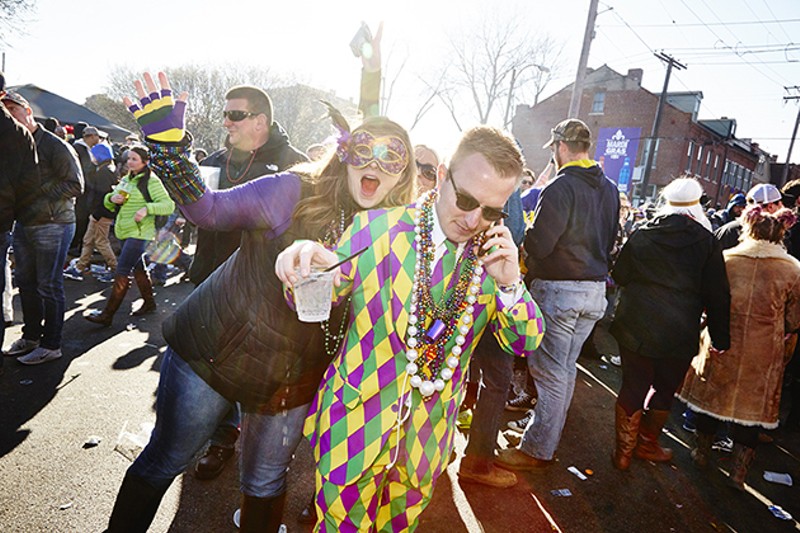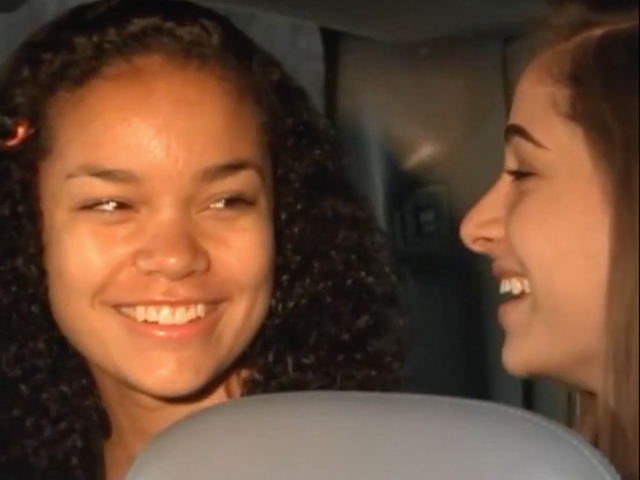Now we're cooking. Valentine's Day, Mardi Gras, the start of St. Louis' winter theater season — things are heating up, metaphorically speaking. This new year is shaping up just fine so far.
1. Enter the wild world of Charles Busch
No real American will be surprised to learn that the local Method acting class is actually a recruiting tool of those godless communists — except for Mary Dale. As cinema's leading lady, Mary depends on the studio's star system to maintain her career and top billing. When she discovers her husband is learning the Method, she realizes it's up to her to stop the commies and emotion-driven acting in order to save her country. Charles Busch's comic play Red Scare on Sunset mixes the McCarthy era with A Star Is Born, with a touch of Reagan-era conservatism. Stray Dog Theatre presents Red Scare on Sunset at 8 p.m. Thursday through Saturday (February 8 to 24) at Tower Grove Abbey (2336 Tennessee Avenue; www.straydogtheatre.org). Tickets are $25 to $30.
2. Meet the new disease
Albert Ostermaier's drama Infected centers on a lone day trader. He's under quarantine, and his mental health is swiftly deteriorating under his protracted isolation — or maybe it's his mysterious malady that's eating away at his brain? Whichever it is, he's definitely slipping free of reality; he's begun to think he caught his virus from the stock market itself, as he explains in a frantic monologue about his life, his work and his disease. Upstream Theater presents the American premiere of Infected, translated by Philip Boehm from Ostermaier's original German. Performances take place at 8 p.m. Thursday to Saturday and 7 p.m. Sunday (February 9 to 24), with an additional 2 p.m. show on Sunday, February 25, at the Kranzberg Arts Center (501 North Grand Boulevard; www.upstreamtheater.org). Tickets are $25 to $35.
3. See a tough tale about forbidden love and bad memories
Old lovers reunite in David Harrower's play Blackbird, but this get-together is far from a happy one. Una shows up at Ray's office and demands to speak with him about the way things between them ended. Ray would rather not, because he's made a new life for himself and doesn't want to ruin it. Una feels she's owed something from Ray, however — he did leave her when she was just twelve years old, and as an adult he should have handled it better. Blackbird is a tense (and potentially upsetting) play about uncomfortable subjects, and a happy end is not in store. St. Louis Actors' Studio presents Blackbird at 8 p.m. Thursday through Saturday and 3 p.m. Sunday (9 to 25) at the Gaslight Theater (358 North Boyle Avenue; www.stlas.org). Tickets are $30 to $35.
4. Oh, the humanity
Brigid Blake has invited the family to her place for Thanksgiving, despite her place being a basement apartment in New York's Chinatown. Her older sister is distracted, her parents are worried about the economy, her grandmother has Alzheimer's disease and drifts in and out of the gathering, and her trust-fund boyfriend is strangely attracted to all of these new people and their various real-world problems. Stephen Karam's Pulitzer Prize-winning play The Humans shows a regular working family come together, drive each other slightly crazy again and also realize what they have in each other. The Repertory Theatre St. Louis presents The Humans Tuesday through Sunday (February 9 to March 4) at the Loretto-Hilton Center (130 Edgar Road; www.repstl.org). Tickets are $18.50 to $89.
5. It's Hurricane season in Soulard
It's been a while since everybody gathered in Soulard to celebrate the onset of the season of self-denial and contemplation, but St. Louis never forgets the big day: Saturday, February 10, is here, and so is the Bud Light Grand Parade. At 11 a.m. at Busch Stadium (601 Clark Avenue; www.stlmardigras.org), the parade starts its march toward Soulard and the Anheuser-Busch Brewery. The theme is "Celebrating #Muny100," so expect the various krewes to show-biz it up in their best musical-theater flair. As always, watching the parade is free, and you just might catch something while you're there: More than 10 million strands of beads will be flung from floats along the parade route. The party in Soulard will have already started by the time the parade steps off — it's gonna get crowded and loud before it's all over. Will it be as cold as February normally is? If you're worried, you have options. The Bud Light Party Tent, which is in fact two climate-controlled tents, will have a lunch buffet, open bar and DJs from 9 a.m to 6 p.m., and tickets are $125. If your ideal Mardi Gras includes hanging out with some of the most famous and personable St. Louis Blues players in team history, you want to buy tickets for The Blues Alumni Party Tent. It also sports an open bar and lunch buffet, but adds a bubble-hockey tournament and hobnobbing with some local hockey legends. The Blues Alumni Party Tent is open from 9 a.m. to 5 p.m., and admission is $110.
6. Witness the dances of love
Not only is Saturday Mardi Gras in St. Louis, it's also the unofficial observation of Valentine's Day this year (the actual day is Wednesday, which is a tough break for a romantic holiday). To mark the occasion, St. Louis Ballet returns to the stage with Love Stories. The program matches ballet to the music of the Romantics. Christoper d'Amboise uses the music of Franz Schubert for his pas de deux Pandora's Box, while Miriam Mahdaviani's Between the Lines requires the talents of the entire company performing to George Gershwin's "Three Preludes." Gen Horiuchi provides two dances for the show: Love Stories is a world premiere set to St. Louis contemporary composer Barbara Harbach's Transformations for String Quartet and Carondelet Caprice for Chamber Ensemble, while Horiuchi's La Vie uses the music of Claude Bolling. Love Stories is performed at 8 p.m. Saturday and 2:30 p.m. Sunday (February 10 and 11) at the Touhill Performing Arts Center on the University of Missouri-St. Louis campus (1 University Drive at Natural Bridge Road; www.touhill.org). Tickets are $24 to $59.
7. A group of pioneering women get their due
Henrietta Leavitt has questions about deep space and Earth's place and role in the universe, so she gets a job at the Harvard Observatory in hopes of finding satisfying answers. Instead, she's confronted by the very unsatisfactory reality that women aren't allowed to use the telescope. Her dream job turns out to be grunt work, as she's expected to catalog all the stars revealed on the telescope's photographic plates, while men pursue the business of discovery. Women are capable of seeing what men cannot, and in those plates Leavitt found something no one else had noticed and broke new ground in astronomy. Lauren Gunderson's play Silent Sky charts the lives and work of early twentieth-century female astronomers, and how they defied the odds to do great work in an age when society mostly demanded they stay out of the way and procreate. West End Players Guild presents Silent Sky at 8 p.m. Thursday through Saturday and 2 p.m. Sunday (February 9 to 18) at the Union Avenue Christian Church (733 North Union Avenue; www.westendplayers.org). Tickets are $20 to $25.
8. Learn about St. Louis' worst year ever
Like many older cities, St. Louis has had good years and bad years. But 1849 was clearly the worst the city ever survived. Settlers were streaming into town, which was the last place to get supplies before continuing on into the vast unknown of the western territories. The influx of people strained St. Louis' limited infrastructure, and helped spread disease like wildfire (cholera would kill perhaps ten percent of the population that year alone). Speaking of wildfire, in mid-May the steamboat The White Cloud caught fire while moored at the bustling riverfront. It broke loose and set fire to other watercraft, which then provided a route for the flames to spread to the city itself. Before it was all over, more than 400 buildings were destroyed, making the St. Louis Fire of 1849 the most destructive in our city's history. Christopher Gordon, the Missouri History Museum's director of library and collections, researched this year of woe using contemporary publications, citizens' diaries and private letters to get a complete picture of St. Louis' most dire year. His book Fire, Pestilence, and Death: St. Louis, 1849 recounts the story of St. Louis' near demise and the unshakable optimism of its people, who were convinced things had to get better at some point. Gordon discusses Fire, Pestilence, and Death at 7 p.m. Tuesday, February 13, at the Missouri History Museum (Lindel Boulevard and DeBaliviere Avenue; www.mohistory.org). Admission is free.






